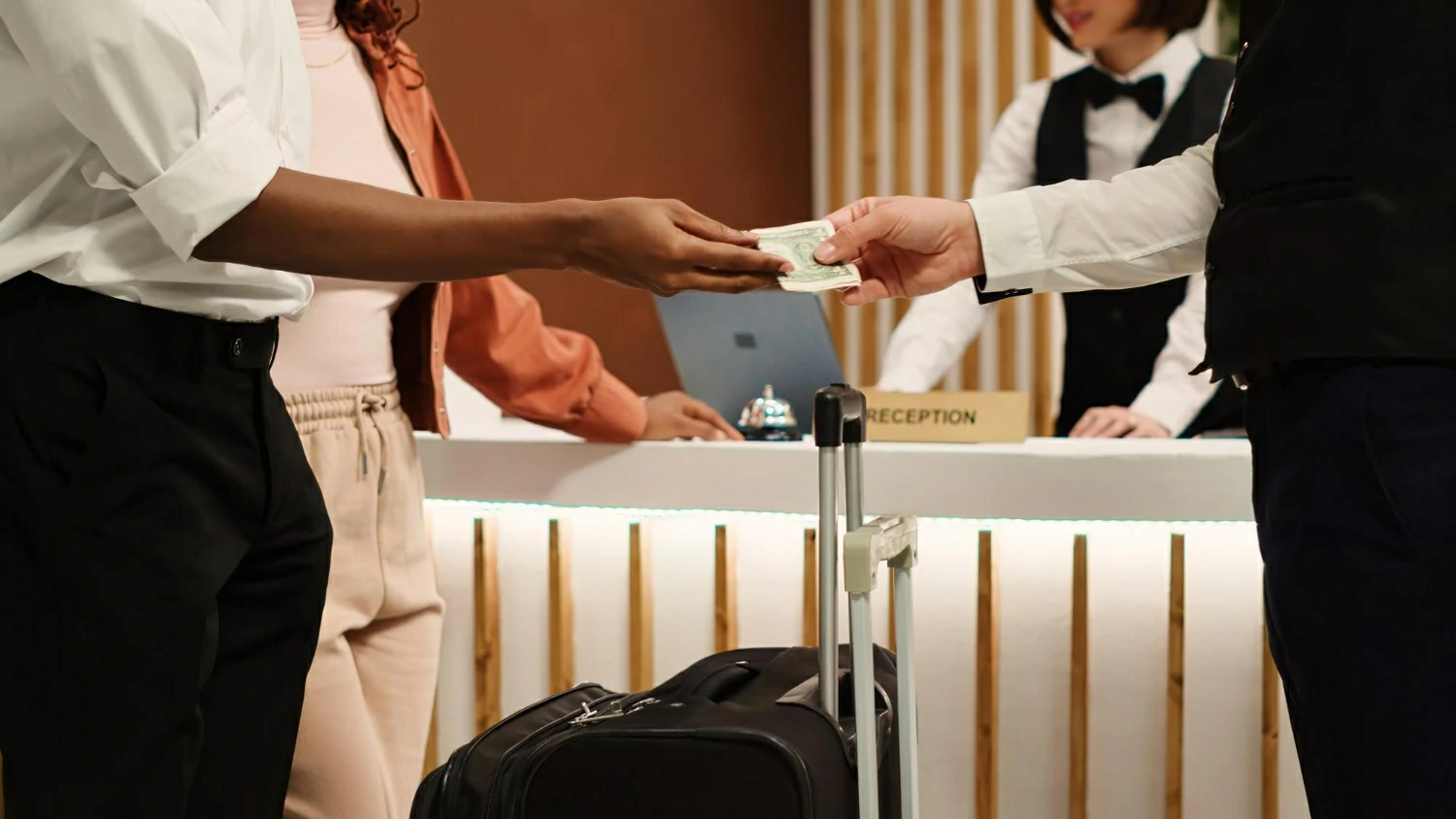Why did my hotel charge disappear? Answer is – Hotel charges can sometimes disappear from your credit card or bank statement for a few reasons. The most common are pre-authorizations, delayed processing, and refunds. A pre-authorization is a temporary hold placed to ensure you have funds for incidentals; it falls off after checkout. Delayed processing means the hotel hasn’t finalized the charge. Refunds could occur if you canceled or had an issue with your stay.
Summary
- Hotel charges initially appearing and then disappearing is a common occurrence.
- The most frequent reason is pre-authorization holds, which are temporary and release after checkout.
- It may take a while for the hotel to process the final charges, leading to a delay in them appearing on your statement.
- In some cases, you may receive a refund if you shortened your stay, canceled in advance, or experienced issues warranting compensation.
Why Did My Hotel Charge Disappear?

You’ve just returned from a relaxing vacation or a successful business trip. As you review your credit card statement, you notice something odd – the hotel charge has vanished. Where did it go? Should you be worried?
The good news is that disappearing hotel charges are a relatively common occurrence and, in most cases, there’s a simple explanation. Let’s explore why this happens and what it means for you.
Reasons Behind the Disappearing Act
There are several reasons why a hotel charge might play a game of peek-a-boo on your bank statement. Understanding these reasons is the first step towards resolving any concerns you may have.
Sometimes it might be a simple processing delay or a pre-authorization hold placed on your account. In rarer cases, it could even signal a refund.
Sarah Peterson Expert Opinion
“Disappearing hotel charges can cause a bit of initial confusion, but there’s rarely anything to worry about,” explains Sarah Peterson, a travel industry expert with over a decade of experience in hotel accounting. “Most often, it’s a matter of timing or temporary holds placed by the hotel. Understanding the mechanics behind these processes will give you peace of mind.”
Pre-Authorization Holds – The Most Common Culprit
1. What is a pre-authorization hold?
Think of a pre-authorization hold as a security deposit the hotel places on your credit or debit card.
It’s a way for them to ensure you have sufficient funds to cover your room charges as well as any potential incidentals like room service, minibar usage, or damages.
It’s important to note that this hold is not a final charge. It’s simply a temporary reservation of funds on your card.
Explanation of their purpose (covering incidentals)
Hotels use pre-authorizations to minimize their financial risk. Guests may incur additional charges during their stay, and the hotel wants to guarantee they’ll receive payment.
Pre-authorization protects the hotel in case the guest leaves without settling their bill or if the final charges exceed the initial estimate.
How they differ from finalized charges
Here’s where things can get a bit confusing. A pre-authorization hold will initially appear on your bank statement, sometimes even resembling a full charge.
However, the crucial difference is that it’s not yet deducted from your available balance.
When you check out, the hotel will finalize your bill and process the actual charge against the pre-authorization. This is when the money officially leaves your account.
2. How long do pre-authorization holds last?
Unfortunately, there’s no one-size-fits-all answer. The release time for a pre-authorization hold depends on both your bank’s policies and the specific hotel’s procedures.
Typically, it can take anywhere from a few days to a week after checkout for the hold to disappear. In some cases, it may take even longer, up to 30 days.
Typical time frame for hold release (can vary by bank/hotel)
For information on how long your particular bank holds authorizations, it’s best to check their website or contact their customer service.
You might also find the hold release policy listed in your cardholder agreement.
3. What to do if the hold doesn’t disappear?
Patience is often the first step – pre-authorization holds generally clear automatically. However, if the hold persists beyond a reasonable timeframe, here’s what to do:
Contact the hotel: Start by reaching out to the hotel where you stayed. The front desk or billing department should be able to confirm that the final charge was processed and provide an estimated timeline for the hold release.
Contact your bank: If the hotel can’t assist or the hold lingers, contact your bank or credit card issuer. They have the power to investigate the hold and potentially expedite its release.
Michael Thompson Expert Opinion
“While disappearing charges due to pre-authorizations are normal, I always advise guests to keep their hotel receipts,” says Michael Thompson, a hotel manager with 15 years of experience. “It simplifies any inquiries with banks or the hotel itself, should the hold release take longer than usual.”
Delayed Processing – When the System Takes Time

1. How does hotel billing work?
When you check out of a hotel, it may feel like your final bill appears magically. However, there’s a process involved in getting those charges from the hotel’s internal systems to your credit card or bank statement. Let’s break it down:
Charge Calculation: The hotel first determines your total bill, including room fees, taxes, restaurant charges, room service, and anything else you may have used during your stay.
System Processing: The hotel’s billing system initiates the charge against whatever payment method you provided (credit or debit card). Note that this is where an initial pre-authorization hold would be converted to a finalized charge.
Batch Processing: Most hotels don’t process each guest’s charge individually. Transactions are typically bundled into “batches” and sent to the card payment networks (like Visa or Mastercard) for approval.
Bank Processing: Your bank or credit card issuer then receives the charge information from the payment network. At this point, the charge finally becomes visible on your account and is deducted from your available balance.
2. Reasons for delays
Several factors can lead to a delay between your hotel checkout and the charge appearing on your statement:
Busy periods: Hotels experiencing high occupancy may have a backlog of charges to process. It’s like rush hour traffic for the billing system, and your transaction may get stuck in the queue.
System updates: If the hotel has recently updated its property management software or payment processing systems, temporary glitches might cause a slowdown.
Third-party bookings: If you booked your stay through a travel website or agency, there’s an extra step involved. While your card might be charged for your deposit at the time of booking, the hotel often only charges the card on file when you check out. This additional layer can add to the processing time.
3. What to do while you wait
The best course of action in the case of a delayed charge is a combination of patience and proactivity:
Keep your reservation confirmation: This document will have essential details like your confirmation number, stay dates, and expected room rate. It serves as a point of reference if you need to communicate with the hotel.
Wait a reasonable amount of time: Allow a few business days for processing. If after a week you still don’t see the charge, a follow-up is warranted.
Follow up with the hotel politely: Contact the hotel’s billing department and inquire about the status of your charge. Be ready to provide your reservation details.
Sarah Peterson Expert Opinion
“Remember, hotels often have specific billing cycles,” explains Sarah Peterson, a travel industry expert. “Your checkout date and the hotel’s internal deadlines for processing batches may not perfectly align. This can create a temporary illusion that your charge has disappeared.”
Refunds – Did You Get Money Back?

1. Situations that might lead to a refund
Here are some of the most common circumstances under which you might receive a refund from a hotel:
Pre-paid cancellations: Many hotels offer pre-paid rates that are typically cheaper than their flexible counterparts. However, these often come with specific cancellation policies. If you cancel within the specified window outlined in your reservation terms, you should be eligible for a refund of at least a portion of your pre-payment.
Issues during the stay leading to compensation: If you experienced significant issues with your hotel stay that the hotel couldn’t resolve on the spot (for example, serious cleanliness problems, unavailable amenities, or excessive noise), you might be entitled to partial or full compensation. The hotel may process this as a refund to your card.
Overcharges or billing errors: Mistakes happen! If you notice that your final hotel bill includes charges for things you didn’t use (like the minibar or paid movies) or if you were charged an incorrect room rate, the hotel should issue a refund once you bring it to their attention.
2. How to tell if you’ve been refunded
Refunds, unlike pre-authorization holds, usually leave a clear trace. Here’s how to spot them:
Monitoring your statement: Carefully scrutinize your credit card or bank statement. A refund will typically appear as a separate transaction credited back to your account. It may take a few business days to process, so keep a close eye on it for a week after your expected refund date.
Checking the hotel’s refund policy: Most hotels have specific refund policies outlined on their websites or in your booking confirmation. These policies often dictate how quickly a refund should be processed after a qualified event, such as a cancellation or an issue with your stay.
Michael Thompson Expert Opinion
“Always keep track of your correspondence with the hotel, whether it’s emails about cancellations or notes from conversations with the front desk about issues on-site,” advises Michael Thompson, a seasoned hotel manager. “This documentation can be invaluable if you need to follow up about a possible refund.”
Other Possible (but Less Common) Reasons

1. Incorrect card information
Technology glitches and human error can sometimes lead to incorrect payment details getting entered into the system. Here’s how this plays out:
- Typographical Errors: A simple mistyped digit in your credit or debit card number, incorrect expiration date, or misspelling of the cardholder’s name might mean that the charge was never actually applied to your card.
- Outdated Card on File: If your hotel reservation was made in advance and in the interim your card expired or you received a replacement card with a new number, an attempt to charge the old card details would fail.
How to Spot This: Double-check your hotel reservation confirmation for any errors in your provided card information. If you spot a discrepancy, reach out to the hotel so they can update their records and process the charge with the correct details.
2. Fraudulent activity
It’s important to be vigilant about potential fraudulent charges, especially in the travel industry. Here’s how fraudulent activity can factor into disappearing hotel charges:
- Card Skimming: If your credit or debit card information was compromised (for example, through a skimming device at a gas station or restaurant), a fraudster might attempt a test transaction at a hotel. Sometimes, these fraudulent transactions get caught and flagged by your bank or the hotel’s security systems. The charge might initially appear but then quickly disappear if the transaction was blocked.
- Stolen Card Used for Booking: If your card number was stolen, the thief might attempt to book a hotel stay using your information. When you report the fraudulent activity to your bank, the transactions would likely be reversed, causing the charge to vanish from your statement.
How to Spot This: Regularly monitor your credit card and bank statements for any unauthorized activity. If you notice anything suspicious, immediately contact your bank or card issuer to report fraudulent charges.
3. Bank or credit card errors
Financial institutions, even with their sophisticated systems, are not immune to occasional glitches. Here’s how such errors might play a role:
- System Miscommunication: Sometimes there can be errors in communication between the hotel’s payment processor and your bank’s systems. This might result in a charge temporarily appearing on your statement only to be reversed due to a technical error.
- Duplicate Charges: In rare cases, a guest’s card might be accidentally charged twice. Once the error is detected (either by the hotel or through your card issuer’s auditing), one of the charges would be reversed.
How to Spot This: Carefully review your bank statements to identify any accidental duplicates or charges that don’t correspond to your expected hotel bill. If you find discrepancies, contact your bank for clarification.
Sarah Peterson Expert Opinion
“While most disappearing hotel charges have benign explanations, it’s crucial to always review your financial statements for unfamiliar transactions,” emphasizes Sarah Peterson, a travel industry expert. “Proactivity can help you catch fraudulent activity early and avoid headaches down the line.”
Conclusion
While a temporarily disappearing hotel charge can cause a bit of initial confusion, the vast majority of the time there’s a perfectly reasonable explanation behind it. Here’s a quick recap of the main scenarios we’ve discussed:
- Pre-authorization holds: The most common reason – a temporary hold placed to ensure you have sufficient funds.
- Processing delays: It takes time for charges to move through the hotel and banking systems.
- Refunds: You may be entitled to a refund due to cancellation, an issue with your stay, or a billing error.
- Less common reasons: Incorrect card information, fraudulent activity, or bank/card errors.
Remember, the best course of action is usually to start by contacting the hotel directly. They should be able to shed light on the status of your charge or explain any refunds.
FAQs
Q: How long will a hotel pre-authorization hold last?
This varies by bank and hotel, but it typically takes a few days to a week after checkout for the hold to fully release. In some cases, it might take up to 30 days.
Q: Do I need to do anything about a pre-authorization hold?
Usually not. The hold should release automatically. If it persists beyond a few weeks, reach out to your bank and the hotel.
Q: How can I tell if I’ve received a refund from the hotel?
Monitor your credit card or bank statement carefully. Refunds show up as credits back to your account. Also, check the hotel’s refund policy on their website or in your reservation documents.
Q: What if I think a disappearing hotel charge is fraudulent?
Immediately contact your bank or credit card company to report the suspected fraud. They will investigate and assist with canceling your card if necessary.
Q: Where can I find more information about my bank’s specific policies on pre-authorization holds?
Review your cardholder agreement or check your bank’s website. They likely have a section detailing how they handle temporary charges and authorizations.







